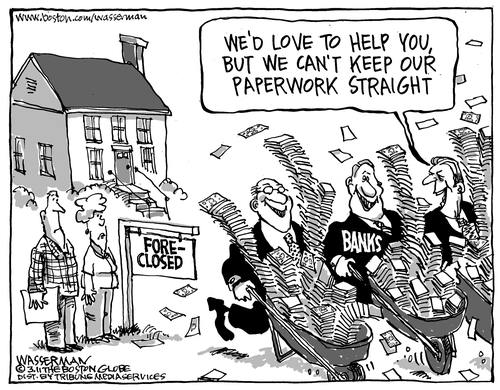 Nevada Attorney General Catherine Cotez Masto has filed a 606 count criminal indictment against two title company employees for for supervising the filing of tens of thousands of fraudulent documents in a robo-signing scheme. This is the statement from Masto’s office (pdf):
Nevada Attorney General Catherine Cotez Masto has filed a 606 count criminal indictment against two title company employees for for supervising the filing of tens of thousands of fraudulent documents in a robo-signing scheme. This is the statement from Masto’s office (pdf):
The Office of the Nevada Attorney General announced today that the Clark County grand jury has returned a 606 count indictment against two title officers, Gary Trafford and Gerri Sheppard, who directed and supervised a robo-signing scheme which resulted in the filing of tens of thousands of fraudulent documents with the Clark County Recorder’s Office between 2005 and 2008.
According to the indictment, defendant Gary Trafford, a California resident, is charged with 102 counts of offering false instruments for recording (category C felony); false certification on certain instruments (category D felony); and notarization of the signature of a person not in the presence of a notary public (a gross misdemeanor). The indictment charges d efendant Gerri Sheppard, also a California resident, with 100 counts of offering false instruments for recording (category C felony); false certification on certain instruments (category D felony); and notarization of the signature of a person not in the presence of a notary public (a gross misdemeanor).
“The grand jury found probable cause that there was a robo-signing scheme which resulted in the filing of tens of thousands of fraudulent documents with the Clark County Recorder’s Office between 2005 and 2008,”said Chief Deputy Attorney General John Kelleher.
The indictment alleges that both defendants directed the fraudulent notarization and filing of documents which were used to initiate foreclosure on local homeowners.
The State alleges that these documents, referred to as Notices of Default, or “NODs”, were prepared locally. The State alleges that the defendants directed employees under their supervision, to forge their names on foreclosure documents, then notarize the signatures they just forged, thereby fraudulently attesting that the defendants actually signed the documents, which was untrue and in violation of State law. The defendants then allegedly directed the employees under their supervision to file the fraudulent documents with the Clark County Recorder’s office, to be used to start foreclosures on homes throughout the County.
The indictment alleges that these crimes were done in secret in order to avoid detection. The fraudulent NODs were allegedly forged locally to allow them to be filed at the Clark County Recorder’s office on the same day they were prepared.
Although the two Lender Processing Services employees, Gary Trafford and Gerri Sheppard, are deemed to be little fish there is speculation the Ms. Masto is using this as a hook to an go after the whales. Yves Smith at naked capitalism:
That strongly suggests that Masto is, as we suggested earlier, using these indictments as a wedge to go after much broader abuses in the servicing industry. LPS’s biggest business is its Default Services Group, which both managed the operations of foreclosure mills (people with knowledge of LPS charge that the firm even kicks out certain standard form documents for foreclosure mill attorneys to file) and also often acted as the arms and legs of servicers in other arenas (for instance, managing, or more accurately, mismanaging property seized in foreclosure).
LPS has always taken the position that anything it did was at the direction of and with the full knowledge of the servicers. If Masto is shrewd, her objective will be to audit LPSs’ software, since that will demonstrate pattern and practice, and it will be impossible for servicers to deny that processes embodied in ongoing, routinized activities were unknown to them.
David Dayen at FDL agrees that this may well be the first step in getting the higher ups who made, and are still, making a fortune on foreclosures:
LPS hasn’t been indicted, but you can see where this is going. We know enough now to know that this casual forgery and document fraud was official policy for the company. Indictments of Trafford and Sheppard will almost certainly not end there. Everyone who worked for LPS in Nevada will be culpable. [..]
The fact that they are LPS employees also suggests this is just a first step. This could be a way to get at the software that LPS uses to create documents, which would prove pattern and practice. LPS was central to the entire robo-signing scheme across foreclosure mill law firms and mortgage servicers. And they consistently maintain that they worked at the direction of the servicers and with their full knowledge. So that ropes in the servicers as well.
This is a very important indictment, and it shows how methodical Masto has been about going after widespread industry abuse. It’s only just beginning, but bravo for her.
As has been reported, despite the meager attempts at an agreement to settle this and exonerate the banks of any wrong doing by several other Attorney Generals, the robo-signing continues:
Reuters reviewed records of individual county clerk offices in five states — Florida, Massachusetts, New York, and North and South Carolina — with searchable online databases. Reuters also examined hundreds of documents from court case files, some obtained online and others provided by attorneys.
The searches found more than 1,000 mortgage assignments that for multiple reasons appear questionable: promissory notes missing required endorsements or bearing faulty ones; and “complaints” (the legal documents that launch foreclosure suits) that appear to contain multiple incorrect facts.
These are practices that the 14 banks and other loan servicers said had occurred only on a small scale and were halted more than six months ago. [..]
Reuters reviewed records of individual county clerk offices in five states — Florida, Massachusetts, New York, and North and South Carolina — with searchable online databases. Reuters also examined hundreds of documents from court case files, some obtained online and others provided by attorneys.
The searches found more than 1,000 mortgage assignments that for multiple reasons appear questionable: promissory notes missing required endorsements or bearing faulty ones; and “complaints” (the legal documents that launch foreclosure suits) that appear to contain multiple incorrect facts.
These are practices that the 14 banks and other loan servicers said had occurred only on a small scale and were halted more than six months ago.
Meanwhile, as Yves Smith pointed out this Summer, the bankers continue to lie to congress that they have stopped the practice:
We’ve heard numerous bank executives swear piously before Congressional hearings that those “paperwork problems” that led major servicers to halt or slow foreclosures on a widespread basis last year were “mistakes”. That was already a really big lies, since “mistake” means the practice was not deliberate and was presumably isolated, when in fact robosigning was a widespread, institutionalized practice.
14 major servicers then swore in consent orders earlier this year that they’d stop doing all that bad stuff. But with compliance weak (the banks get to hire the overseers!), they appear to have decided they don’t need to change their ways all that much. Indeed, the record of consent orders is underwhelming; for instance, both Nevada and Arizona are suing Countrywide for violations of past agreements.
Meanwhile the Obama Justice Department continues to try to sweep this massive fraud under the rug.
Yes, bravo, Ms. Masto.
Nevada Robosigning Indicment 11-16-11




Recent Comments